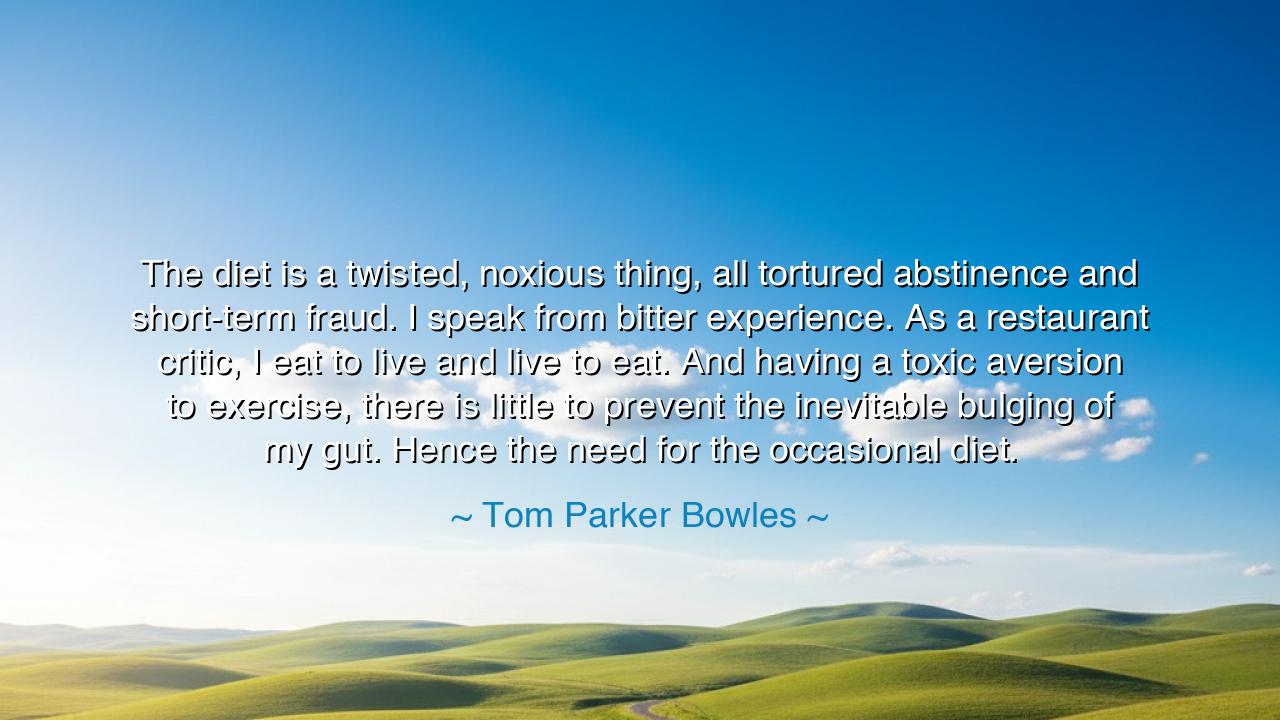
The diet is a twisted, noxious thing, all tortured abstinence and
The diet is a twisted, noxious thing, all tortured abstinence and short-term fraud. I speak from bitter experience. As a restaurant critic, I eat to live and live to eat. And having a toxic aversion to exercise, there is little to prevent the inevitable bulging of my gut. Hence the need for the occasional diet.






The words of Tom Parker Bowles, “The diet is a twisted, noxious thing, all tortured abstinence and short-term fraud. I speak from bitter experience. As a restaurant critic, I eat to live and live to eat. And having a toxic aversion to exercise, there is little to prevent the inevitable bulging of my gut. Hence the need for the occasional diet,” are both confession and critique — a humorous lament sung from the heart of human contradiction. Beneath the laughter and self-mockery lies a timeless truth: that the struggle between desire and discipline, between the pleasures of the flesh and the pursuit of balance, has accompanied humankind since the dawn of appetite itself.
In his playful yet piercing tone, Bowles exposes the futility of the modern obsession with dieting — the endless cycle of indulgence and punishment, pleasure and guilt. The “twisted, noxious thing” he speaks of is not food itself, but our relationship with it — a relationship poisoned by extremes. To diet, in his words, becomes not an act of care, but an act of penance; not a path to health, but a ritual of self-denial. He mocks the hypocrisy of diets that promise renewal but deliver only shame and temporary illusion — the “short-term fraud” of a culture that worships both abundance and restraint. His words remind us that food, once sacred, has become entangled with vanity and self-punishment.
The ancients, however, knew the sacred nature of moderation. The philosophers of Greece spoke often of sophrosyne — the virtue of temperance, the art of balance between indulgence and restraint. The great physician Hippocrates, father of medicine, taught that health was harmony — that excess, whether in eating or abstaining, was the root of disease. To starve oneself was as unnatural as to gorge. In those days, food was not an enemy but a teacher: each meal a lesson in gratitude, patience, and proportion. Bowles, with his modern irony, echoes that same wisdom — that when the joy of eating turns to obsession, whether of excess or deprivation, we lose our harmony with life.
His confession, too, carries humility. As a restaurant critic, he stands as one who must live between two worlds: the world of pleasure, where food is art and life is celebration, and the world of consequence, where the body must bear the price of its delights. He admits his “toxic aversion to exercise,” and in this, he mirrors every human who wrestles with their own contradictions. He is both sinner and sage — the one who knows better, yet succumbs with laughter to his appetites. In this honesty lies his wisdom: for it is better to laugh at one’s flaws than to hide behind pretense.
Consider, too, the Roman philosopher Epicurus, often misunderstood as a preacher of indulgence. In truth, Epicurus taught that pleasure was the highest good — but only when pursued wisely. The greatest pleasure, he said, was not in constant feasting, but in the contentment that comes from simplicity. The one who can enjoy a crust of bread with gratitude is richer than the king who devours banquets with restlessness. Bowles’ lament about dieting can thus be read as a call to rediscover joy in moderation — to return to the art of eating not as battle, but as communion with life itself.
The “bulging of my gut,” as he humorously admits, becomes a symbol of what all humanity faces: the visible mark of our excesses and our failures of restraint. Yet, instead of despairing, Bowles meets it with humor. This is no small thing. For laughter itself is a form of wisdom — the recognition that imperfection is part of our shared humanity. To laugh at our folly is to transcend it; to see our struggles with the body as part of the grand comedy of being alive. In this way, his words are not cynical, but compassionate — an invitation to forgive ourselves for being human.
Let this, then, be the teaching: do not make war upon your appetite, but seek peace with it. Eat not as a glutton, nor as a monk, but as one who honors the body and the spirit alike. Reject the “tortured abstinence” that kills joy, and the reckless indulgence that kills the body. Learn instead the middle path — the one the ancients called the Golden Mean. Let your meals be acts of gratitude, your indulgences tempered by awareness, your discipline guided by kindness.
For as Tom Parker Bowles reminds us, the greatest diet is not of the body, but of the soul — a diet of balance, honesty, and laughter. Eat well, live fully, forgive your hungers, and when you stumble, as all mortals do, smile and begin again. For to live wisely is not to be perfect, but to dance joyfully upon the shifting line between pleasure and restraint — that eternal line where true contentment is found.






AAdministratorAdministrator
Welcome, honored guests. Please leave a comment, we will respond soon